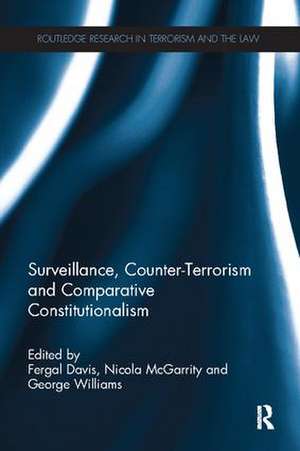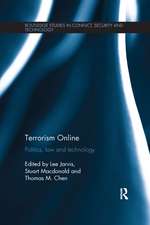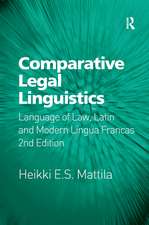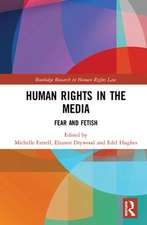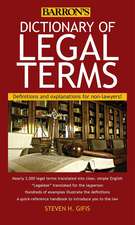Surveillance, Counter-Terrorism and Comparative Constitutionalism: Routledge Research in Terrorism and the Law
Editat de Fergal Davis, Nicola McGarrity, George Williamsen Limba Engleză Paperback – 16 iun 2017
This book brings together leading legal scholars in the field of counter-terrorism and constitutional law, and focuses their attention on the issue of surveillance. The breadth of topics covered in this collection include: the growth and diversification of mechanisms of mass surveillance, the challenges that technological developments pose for constitutionalism, new actors in the surveillance state (such as local communities and private organisations), the use of surveillance material as evidence in court, and the effectiveness of constitutional and other forms of review of surveillance powers.
The book brings a strong legal focus to the debate surrounding surveillance and counter-terrorism, and draws important conclusions about the constitutional implications of the expansion of surveillance powers after 9/11.
| Toate formatele și edițiile | Preț | Express |
|---|---|---|
| Paperback (1) | 316.96 lei 6-8 săpt. | |
| Taylor & Francis – 16 iun 2017 | 316.96 lei 6-8 săpt. | |
| Hardback (1) | 1115.51 lei 6-8 săpt. | |
| Taylor & Francis – 5 dec 2013 | 1115.51 lei 6-8 săpt. |
Preț: 316.96 lei
Preț vechi: 358.92 lei
-12% Nou
Puncte Express: 475
Preț estimativ în valută:
60.68€ • 63.31$ • 50.86£
60.68€ • 63.31$ • 50.86£
Carte tipărită la comandă
Livrare economică 13-27 martie
Preluare comenzi: 021 569.72.76
Specificații
ISBN-13: 9781138094314
ISBN-10: 1138094315
Pagini: 360
Dimensiuni: 156 x 234 x 23 mm
Greutate: 0.67 kg
Ediția:1
Editura: Taylor & Francis
Colecția Routledge
Seria Routledge Research in Terrorism and the Law
Locul publicării:Oxford, United Kingdom
ISBN-10: 1138094315
Pagini: 360
Dimensiuni: 156 x 234 x 23 mm
Greutate: 0.67 kg
Ediția:1
Editura: Taylor & Francis
Colecția Routledge
Seria Routledge Research in Terrorism and the Law
Locul publicării:Oxford, United Kingdom
Public țintă
PostgraduateCuprins
Part 1: Introduction 1. Mapping the Terrain, Fergal Davis, Nicola McGarrity and George Williams 2. A Judicial Perspective: Surveillance Evidence and the Right to a Fair Tria, Anthony Whealy QC Part 2: Who is Watching? 3. Championing Local Surveillance in Counter-Terrorism, Clive Walker 4. Surveillance Regimes in Contemporary India, Ujjwal Singh 5. Privatised Counter-Terrorist Surveillance: Constitutionalism Undermined, Fiona de Londras 6. How Secure is our Privay in Seceurope? European security through surveillance, Moica de Boer and Flora Goudappel Part 3: The Challenges of Technology for the Right to Privacy 7. Preserving Privacy in a Digital Age: Lesson of comparative constitutionalism, David Cole 8. On the End of Freedom in Public Spaces: Legal challenges of wide-area and multiple sensor surveillance systems, Jens Kremer 9. GPS Surveillance and Human Rights Review: The European Court of Human Rights and the United States Supreme Court in Comparative Perspective, Federico Fabbrini and Mathias Vermeulen 10. The Impact of Human Rights Law on Measure of Mass Surveillance in the United Kingdom, Merris Amos Part 4: Surveillance Across Borders 11. Transatlantic Perspectives on Counter-Terrorism Surveillance: Surveillance, borders and the culture of legality, Cian Murphy 12. From the West to the East: Migration of Surveillance Policy Part 5: Surveillance as Intelligence in the United States 13. Warrantless Wiretrapping in the United States, Owen Fiss 14. From Convert to Coercive: A new model of surveillance by intelligence agencies, Nicola McGarrity and George Williams 15. The Use or Intelligence in Counter-Terrorism Prosecutions and the Role of the Prosecutor, David Scharia Part 6: The Potential to Change 16. State Surveillance in an Age of Security, Conor Gearty 17. Politicized Challenges, De-Politicised Responses: Political monitoring in China's transitions, Hualing Fu 18. Internet Surveillance and Poluar Constitutionalism, Vanessa MacDonnell
Descriere
This book examines the constitutional implications, short- and long-term, domestic and international, of the expansion of surveillance powers after 9/11. The contributors who are leading international experts in anti-terrorism and constitutional law take a comparative approach looking at jurisdictions including the United States, Canada, United Kingdom, Europe, Israel, India, Japan, China and Australia, and considers the profound effects of mass surveillance on constitutionalism and the rule of law.
